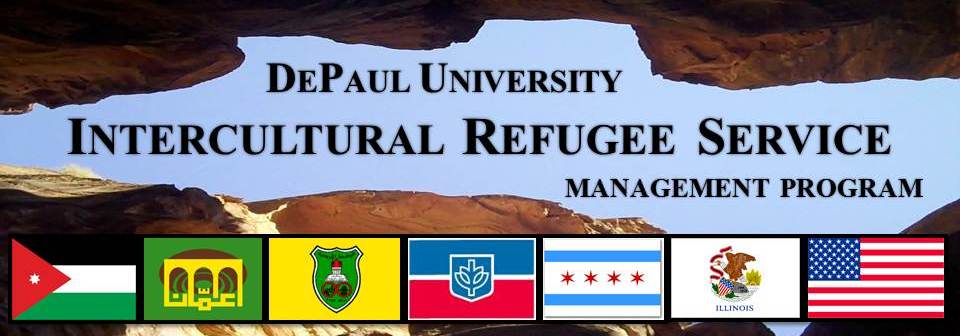
During our stay in Jordan, we never really had the opportunity to talk directly with Iraqis to ask them about their own fears of becoming “Palestinised.” A 2009 report from the Refugee Studies Centre explains how “Most (Iraqi) refugees in Arab host countries feel they are marooned, faced by the prospect of long-term exile and declining interest from governments and support networks.”[2] As the world’s attention shifts away from Iraq to Afghanistan and elsewhere, Iraqi refugees must feel increasingly more isolated and abandoned. In Jordan, Iraqi guests live along side the estimated 1.9 million Palestinian refugees[3] who are still fighting for their right to return home, sixty years after having been expelled from their country. I imagine that for Iraqi refugees living in Jordan, the proximity to the Palestinian refugee crisis must prompt a degree of introspection into their own realities and contemplation over whether this scenario could also happen to them.
We met with various organizations working with Iraqi refugee populations including the United Nations High Commissioner for Refugees (UNHCR), International Organization for Migration (IOM), United States Agency for International Development (USAID), and several national civil society organizations. Along with the Jordanian government agencies, these organizations are doing a tremendous amount of work and are concerned about the security and protection of Iraqi human rights issues. UNHCR provided valuable insight into what have been the key components to effectively working with Iraqi refugee populations. Improving intergovernmental and interagency collaboration and communication as well as remaining flexible and innovative in their approach to new refugee populations were top on their list.
In 2006, when the major influx occurred of Iraqi refugees to surrounding Arab nations, a Human Rights Watch report detailed the dire circumstances of Iraqi refugees in Jordan. The report exposed how Iraqis had no legal status, no access to work, were unable to travel, had inadequate schooling options for their children, and that many refugees were failing to register with UNHCR due to limited access to information and fear. UNHCR responded by informing government agencies of the scale and seriousness of the crisis and began building stronger relations with the Jordanian government, host governments, and destination countries for resettlement. Since 2006, UNHCR has been successful in collaborating with the Jordanian government to create government departments designed to protect and assist Iraqi refugees, to organize trainings with the police force and government officials on national policies regarding refugee protection and how to communicate this information, and to sponsor informational seminars at educational institutions around the region.
The Iraqi refugee crisis has required agencies and governments to rethink what they know about refugee protection and service provision. UNHCR realized that former methods were not going to be successful in reaching Iraqi refugees dispersed in urban, rather than camp, settings. Iraqis have been hesitant in trusting the Iraqi government, host governments, and agencies such as UNHCR because of past trauma and present uncertainties and misinformation. Fear of detention sweeps cause many to remain invisible with hopes of surviving and finding work in the informal economy until they can return back safely to Iraq. UNHCR has adapted strategies to incorporate outreach programs as their key component in reaching communities of Iraqi refugees and field workers spend time going to neighborhoods, educating refugees on their rights, and slowly building credibility.
We didn’t have many chances to talk directly with Iraqi refugees during our stay but we were able to attend an International Refugee Day event at the Princess Basma Youth Resource Center, coordinated and attended by Iraqi refugees. We were given front row seats, were gifted with t-shirts, mugs, candies, coffee and tea. Throughout our trip I felt extremely handicapped by the fact that I do not speak Arabic, however I understood so clearly how this event was a combination of celebration, suffering, and remembrance. This kind of emotion is universal and transcends language. A woman recited a poem repeating the words “Iraq” and “Baghdad” over and over in an expression of longing and nostalgia, a grandmother performed a skit where she sat singing traditional songs to her grandchildren as a lesson in honoring tradition and retaining a sense of where you come from, and an Iraq trivia game with prizes rewarding those who answered correctly and helped retain collective memory and celebrate culture.

As the event came to a close they invited us all to join them on stage and we joined hands and danced in a circle. As I looked around me at the colors, the faces, and the celebration that was happening all around us, I struggled tremendously. I became very present to the fact that our governments actions in the region have caused this crisis and with the knowledge that the U.S. has done too little too late with the capacity and resources they could utilize to find more expeditious solutions to the crisis. I knew that the only thing I was capable of doing at that moment was to listen, to observe, and to be a witness to their testimonies, and their celebration. I hope that our presence was seen as an act of solidarity, a shared desire for a just outcome, and a silent apology.
Photos (Sarah Cunningham)
[1] 2. Amnesty International (2008) Iraq: Rhetoric and Reality: The Iraqi Refugee Crisis. Available at http://www.amnesty.org/en/library/asset/MDE14/011/2008/en/2e602733-42da-11dd-9452-091b75948109/mde140112008eng.pdf. (1-70)
[2] 2. Refugee Studies Centre. “Iraq’s Refugees – Beyond ‘Tolerance’”. Dr. Philip Marfleet and Dr. Dawn Chatty. December 2009. (1-29)
[3] UNRWA. Jordan. http://www.unrwa.org/etemplate.php?id=66. Accessed July 23, 2010.

No comments:
Post a Comment